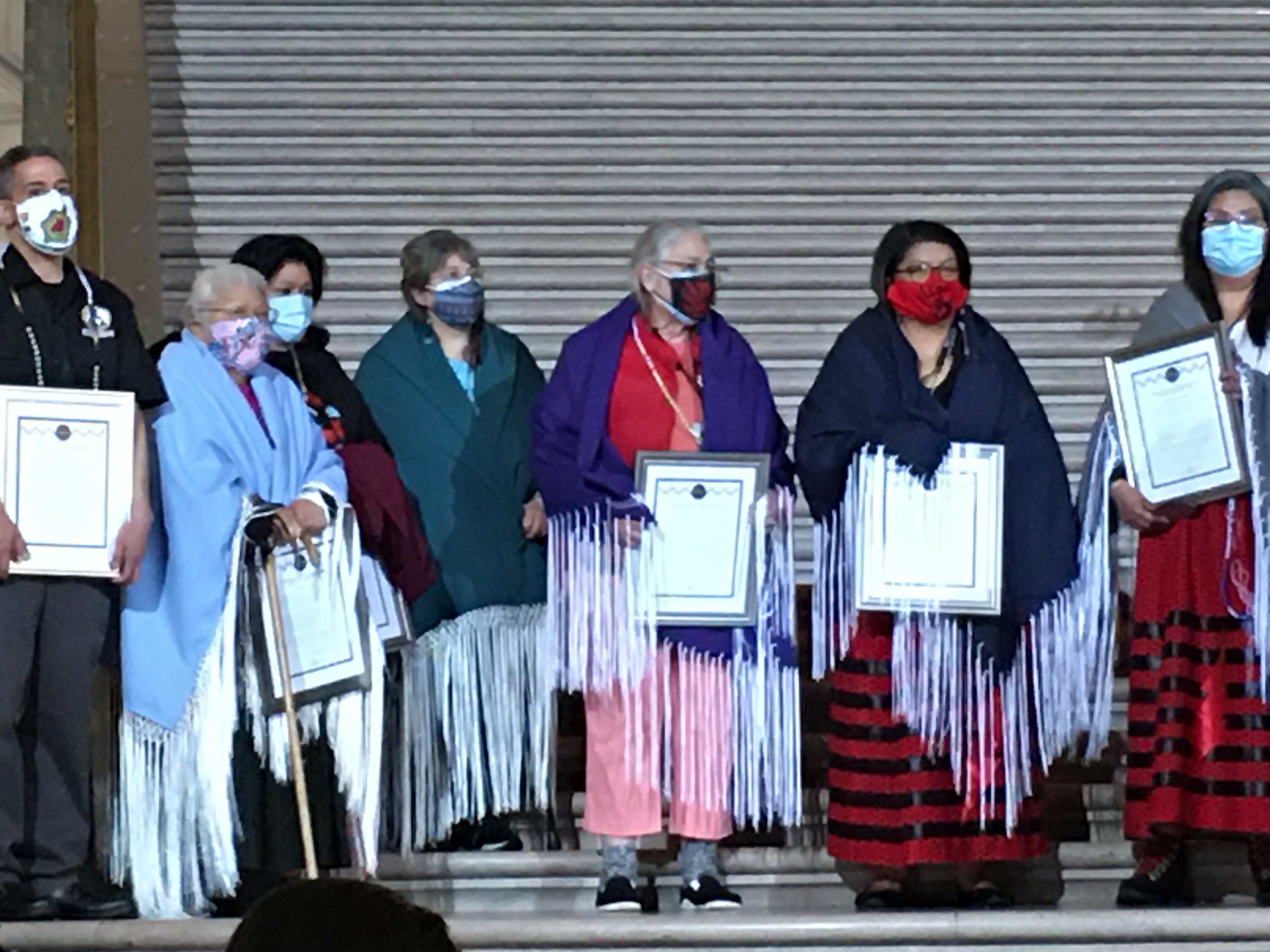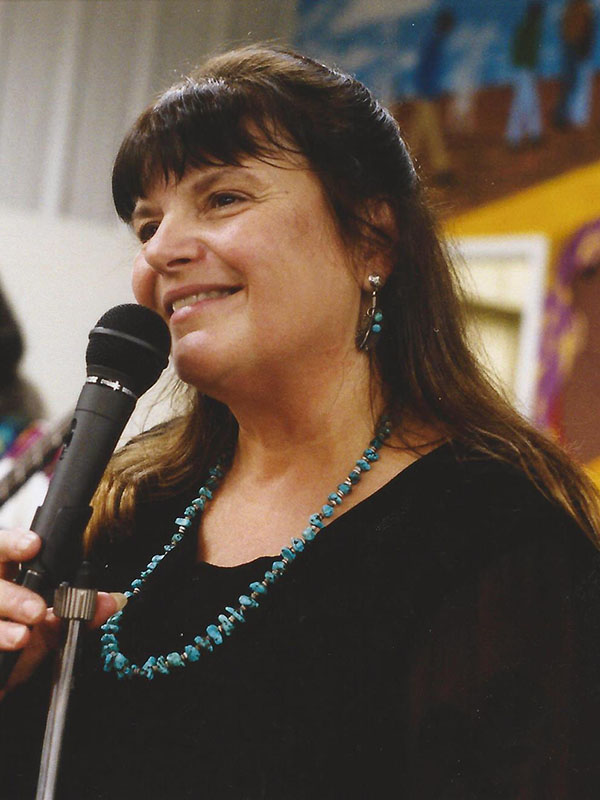
- Details
- By Nanette Deetz
SAN FRANCISCO--Mayor London Breed, speaking at the annual American Indian Heritage Night ceremony under the rotunda in City Hall Nov. 18, announced that she would do “whatever it takes to make sure there is an American Indian Cultural Center.”
Former mayors Willie Brown and the late Ed Lee both honored and recognized the city’s Native American community, said April McGill, the Cultural Center’s executive director, but “Mayor Breed is the first mayor to give us equitable funds in order to continue work in each of our community organizations." McGill is an enrolled member of the Round Valley confederation, and is of Yuki, Little Lake, Wailaki, Pit River, and Wappo heritage.
The $3.2 million approved by Mayor Breed this year is for cultural programming and behavioral health and wellness services. The funds will provide operating expenses to support programs at the new cultural center, within the American Indian Cultural District, established in the Mission in 2019. The grant will also help the Native American Health Center, the Friendship House Association of American Indians, and the International Indian Treaty Council in San Francisco.
Want more Native News? Get the free daily newsletter today.
The American Indian Cultural Center, which has been operating online since 2016, will move into a new space in the heart of the city’s Mission District at 1863 Mission Street. It will contain both offices and space to continue current programming and begin new programs. “We are beginning a capital campaign to design a new building and purchase land back within the American Indian Cultural District,” said McGill.
The cultural district is one of eight in San Francisco, including the Calle 24 Latino Cultural District further south in the Mission and the Castro LGBTQ Cultural District. It grew out of efforts to gain more visibility for American Indians in San Francisco.
“We are documenting historical sites within the American Indian Cultural District that are important to our urban community,” McGill said. Those include the American Indian Film Institute, the American Indian Education program, the Native American Health Center, the Friendship House Association of American Indians and its youth program, the International Indian Treaty Council, and “sites important to the Ohlone, such as those burial sites at Mission Dolores, and other important ceremonial sites,” she explained.
Mission Dolores Park, added to the Cultural District in December 2020, was formerly the site of the Ramaytush Ohlone village of Chutchui.
"The idea for a Cultural Center began when the San Francisco Arts Commission was restructuring their funding, and realized there was no funding distribution for the American Indian community," said McGill. The Native American Health Center and Friendship House had been providing all programming. The American Indian Cultural Center was awarded seed money to begin programming in 2016, under San Francisco State University’s American Indian Studies Program, she explained.
This year’s American Indian Heritage night honored nine members of the American Indian Cultural Center’s advisory committee with awards for their decades of service to the community. The advisory committee made sure food was delivered to Indian families in the city during the COVID-19 pandemic, and that they had access to emergency funding through the Cultural Center. The committee members honored were Bismark Delgado (Chumash); Randy Burns (Northern Paiute/Pyramid Lake); Debbie Santiago (Washo/Osage/Latina/ Fillipina); Alberta Snyder (Washoe); Michelle Antone (Tohono O’odham Nation); Christine Antone (Tohono O’odham), whose daughter Melanie Antone accepted the award for her; Mary Jean Robertson (Cherokee Nation of Oklahoma); and Janine Laiwa (Pomo).
During the Heritage Night ceremony, members of the All Nations drum group provided honor songs. There was a flag ceremony, and exhibition Pow Wow dancers performed, as did Round Valley confederation traditional dancers and singers. The Red Lightning Women Singers did two songs, and the noted Pomo father-and-son blues band Twice As Good played. A closing prayer was offered by Aurora Mamea (Blackfeet Nation).
American Indian Heritage Night also acknowledged the passing this year of three revered elders who dedicated their lives to the American Indian community of San Francisco. Helen Devore Waukazoo (Navajo Nation) was CEO and founder of the San Francisco Friendship House Association of American Indians, a residential alcohol and drug rehabilitation center, where she devoted her life to “putting families back together.” Janet King (Lumbee Nation) was a Native American Health Center clinician who advocated for Native Americans' rights and benefits. Violet Lundberg (Yurok Nation) was a licensed marriage and family therapist who served for 25 years at the Health Center’s Child and Family Guidance Center, and continued to serve clients after she retired.
The Heritage Night event provided a beautiful and powerful way to watch the dream of a new American Indian Cultural Center on San Francisco move toward becoming a reality.
The American Indian Cultural Center is scheduled to open in January 2022.
More Stories Like This
Native News Weekly (August 25, 2024): D.C. BriefsNative Bidaské: The Illusion of Freedom and the Myth of America 250, Leonard Peltier Speaks Out
Monday Morning (March 2, 2026): Articles You May Have Missed This Past Weekend
Native News Weekly (March 1, 2026): D.C. Briefs
Scope Narrowed, Report Withheld: Questions Mount Over Michigan Boarding School Study
Help us defend tribal sovereignty.
At Native News Online, our mission is rooted in telling the stories that strengthen sovereignty and uplift Indigenous voices — not just at year’s end, but every single day.
Because of your generosity last year, we were able to keep our reporters on the ground in tribal communities, at national gatherings and in the halls of Congress — covering the issues that matter most to Indian Country: sovereignty, culture, education, health and economic opportunity.
That support sustained us through a tough year in 2025. Now, as we look to the year ahead, we need your help right now to ensure warrior journalism remains strong — reporting that defends tribal sovereignty, amplifies Native truth, and holds power accountable.
 The stakes couldn't be higher. Your support keeps Native voices heard, Native stories told and Native sovereignty defended.
The stakes couldn't be higher. Your support keeps Native voices heard, Native stories told and Native sovereignty defended.
Stand with Warrior Journalism today.
Levi Rickert (Potawatomi), Editor & Publisher

